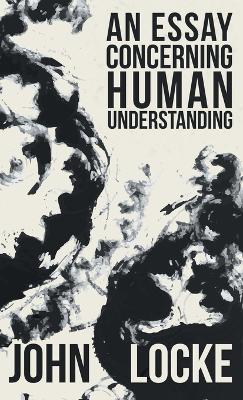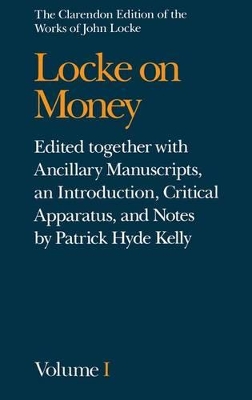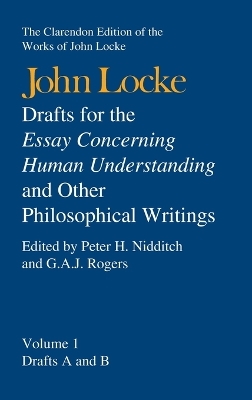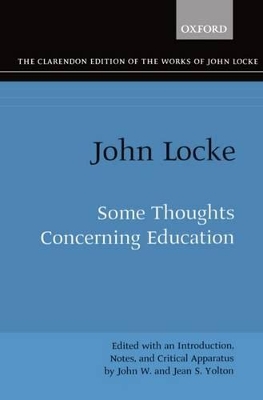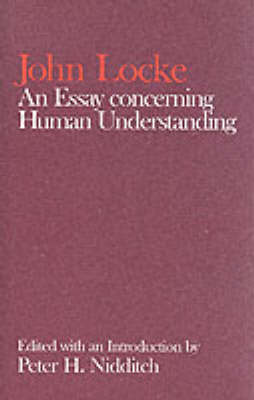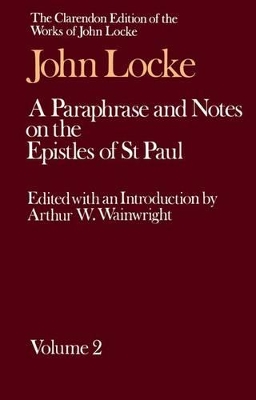Clarendon Edition of the Works of John Locke
7 total works
One of the major works of John Locke (1632-1704), this detailed and comprehensive guide is mainly concerned with moral education. While concentrating on its role in creating a responsible adult and on the importance of virtue as a transmitter of culture, it also ranges over such practical topics as the effectiveness of physical punishment, how best to teach foreign languages, table manners, and varieties of crying.
This critical edition is based on the third (1695) edition, and includes variants from the first five editions, from the Harvard University Library and the British Library drafts, and from Locke's correspondence to Edward Clarke and his wife.
This critical edition is based on the third (1695) edition, and includes variants from the first five editions, from the Harvard University Library and the British Library drafts, and from Locke's correspondence to Edward Clarke and his wife.
A scholarly edition of Essay Concerning Human Understanding by P. H. Nidditch. The edition presents an authoritative text, together with an introduction, commentary notes, and scholarly apparatus.
Locke on Money presents for the first time the entire body of the philosopher's writings on this important subject (other than Two Treatises of Government). Accurate texts, together with an apparatus listing variant readings and significant manuscript changes, record the evolution of Locke's ideas from the original 1668-74 paper on interest to the three pamphlets on interest and coinage published in the 1690s. The introduction by Patrick Hyde Kelly establishes the
wider context of Locke's writings in terms of contemporary debates on these subjects, the economic conditions of the time, and the circumstances of writing and publication. It shows, notably, that Locke's supposed responsibility for the 1696 recoinage is a myth. The account of what Locke derived
from Mercantilist writings and of how he reformulated these in accordance with his philosophy illuminates his contribution to the evolution of economics, and will aid reappraisal of Two Treatises. The picture that emerges confirms Locke's status as major economic thinker, contrary to the prevalent view of recent decades.
There are two volumes in the present edition. The first contains the introductory matter, and the texts of the Early Writings on Interest, 1688-74, and Some Considerations. The second comprises Short Observations, Further Considerations, and the Appendices, Bibliography, and Index.
wider context of Locke's writings in terms of contemporary debates on these subjects, the economic conditions of the time, and the circumstances of writing and publication. It shows, notably, that Locke's supposed responsibility for the 1696 recoinage is a myth. The account of what Locke derived
from Mercantilist writings and of how he reformulated these in accordance with his philosophy illuminates his contribution to the evolution of economics, and will aid reappraisal of Two Treatises. The picture that emerges confirms Locke's status as major economic thinker, contrary to the prevalent view of recent decades.
There are two volumes in the present edition. The first contains the introductory matter, and the texts of the Early Writings on Interest, 1688-74, and Some Considerations. The second comprises Short Observations, Further Considerations, and the Appendices, Bibliography, and Index.
John Locke: Drafts for the Essay Concerning Human Understanding and Other Philosophical Writings
by John Locke
Published 2 August 1990
This is the first of three volumes which will contain all of Locke's extant philosophical writings relating to An Essay Concerning Human Understanding, not included in other Clarendon editions like the Correspondence. It contains the earliest known drafts of the Essay, Drafts A and B, both written in 1671, and provides for the first time an accurate version of Locke's text. Virtually all his changes are recorded in footnotes on each page.
Peter Nidditch, whose highly acclaimed edition of An Essay Concerning Human Understanding was published in this series in 1975, used pioneering editorial techniques in his compilation of Volume 1. Most of the work was completed before his tragically early death in 1983.
Volumes 2 and 3, almost wholly the work of G. A. J. Rogers will contain the third extant draft of the Essay (Draft C), the Epitome and the Conduct of the Understanding. They will also include a History of the Writing of the Essay, together with other shorter writings by Locke.
Peter Nidditch, whose highly acclaimed edition of An Essay Concerning Human Understanding was published in this series in 1975, used pioneering editorial techniques in his compilation of Volume 1. Most of the work was completed before his tragically early death in 1983.
Volumes 2 and 3, almost wholly the work of G. A. J. Rogers will contain the third extant draft of the Essay (Draft C), the Epitome and the Conduct of the Understanding. They will also include a History of the Writing of the Essay, together with other shorter writings by Locke.
Some Thoughts concerning Education, originally published in 1693, is one of John Locke's major works, the culmination of a decade's writings on the subject. It mainly concerns moral education and its role in creating a responsible adult, and the importance of virtue as a transmitter of culture. But Locke ranges also over such practical topics as the effectiveness of physical punishment, table manners, eating habits, varieties of crying, treatment of
servants, and cruelty to animals. He discusses subject-learning, the teaching of foreign languages, and the order of studying different disciplines. Published when Locke was already famous for his doctrines about knowledge, the person, and civil society, this was the most comprehensive and detailed work of its time
on education.
servants, and cruelty to animals. He discusses subject-learning, the teaching of foreign languages, and the order of studying different disciplines. Published when Locke was already famous for his doctrines about knowledge, the person, and civil society, this was the most comprehensive and detailed work of its time
on education.
John Locke: A Paraphrase and Notes on the Epistles of St. Paul
by John Locke
Published 17 December 1987
Locke's posthumously published work on Galatians, 1 and 2 Corinthians, Romans and Ephesians, provides important evidence of his thought during the final years of his life, ad gives insights into his theology which are not available in his other writings. This critical edition of the work is based as far as possible on Locke's manuscript, and includes an editorial introduction, textual, manuscript, and explanatory notes, as well as transcriptions of hitherto
unpublished papers by Locke.
unpublished papers by Locke.

